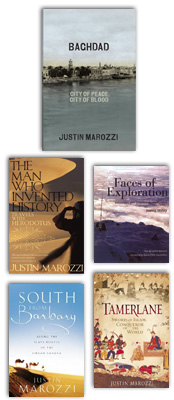When I compiled a list of the top dozen travel writers of the past century for an American magazine the other day, it required some effort not to come up with an entirely British cast. Freya Stark, Norman Lewis, Patrick Leigh Fermor and Jan Morris were musts. So too were V. S. Naipaul and Colin Thubron, still writing up a storm, and the Ibn-Battutah-mad Tim Mackintosh-Smith for a younger generation. Although there was no space for Byron, Bell, Thesiger or Chatwin, no great legerdemain was needed to squeeze in the brilliant Dutchman Cees Nooteboom, Ryszard Kapuscinski, the Polish master of literary reportage, the Irishwoman Dervla Murphy and Martha Gellhorn from across the Atlantic. That left one space.
In the end, it had to go to the American author of this fascinating little distillation of travel wisdom from around the world. Paul Theroux is a master of the genre who gave the then endangered travel-writing scene a fresh lease of life with the publication in 1975 of The Great Railway Bazaar, a high-spirited, four-month railway romp across Europe, the Middle East and Asia. Now 70, he sets out to arrange his thoughts on travel and those of many others into ‘a guidebook, a how-to, a miscellany, a vade mecum, a reading list, a reminiscence’.
Anecdotes, vignettes and bons mots are so densely clustered that readers may well find themselves forever dipping in and out, lured from one entertaining diversion to another. In the ‘Perverse Pleasures of the Inhospitable’, Theroux rightly observes that unwelcoming places have always been a gift to the travel writer, from a friendless Ibn Battutah arriving in Tunis in 1325 (he ‘wept bitterly’) to Apsley Cherry- Garrard’s fearsome Antarctica and Stanley’s savage, cannibal-ridden Congo. There is nothing more tedious than a blissful vacation.
In ‘English Travellers on Escaping England’, he sums up the history of English travel as ‘the history of people in search of sunshine’. Our beloved Prince Philip pops up in ‘Everything is Edible Somewhere’ with his line on indiscriminate, insatiable Chinese appetites: ‘If it has four legs and is not a chair, has wings and is not an airplane, or swims and is not a sub- marine, the Cantonese will eat it.’ Armchair travellers will particularly enjoy the section on ‘The Things That They Carried’.
Interspersed between these miscellanies are a number of mini-chapters dispensing ‘travel wisdom’ from assorted literary luminaries, from Henry Fielding to Paul Bowles. Here is Dervla Murphy advising travellers to mug up on their history before heading off, and to consult guidebooks to identify those areas most frequented by foreigners ‘and then go in the opposite direction’. Then we have Robert Louis Stevenson who expressed one of the traveller’s age-old impulses in Travels with a Donkey in the Cevennes (1879): ‘I travel not to go anywhere, but to go. I travel for travel’s sake. The great affair is to move’. In When the Going Was Good (1947), Evelyn Waugh made the sort of prediction that has hovered over travel literature for years, forecasting its imminent demise. You may as well anticipate the end of travel.
Theroux is exercised by whether the traveller travelled alone or secretly accompanied by spouse or lover. ‘Go alone’ is the second in his list of ten prescriptions. While there is a lot to be said for the solo expedition and the cultural immersion and necessary solitude it engenders, from a literary point of view the advantage is by no means conclusive. Eric Newby’s A Short Walk in the Hindu Kush, a classic of the genre, relies heavily on the hilarious relationship between the author and Hugh Carless, his companion. Chatwin, as Theroux insists, was ‘compulsively gregarious’ during his wanderings, Paddy Leigh Fermor travelled both with friends and alone, and Rebecca West was accompanied by her husband in Black Lamb and Grey Falcon, nothing short of a masterpiece. So although the purist traveller may prefer to go it alone, this has no automatic bearing on the quality of the literary fruits to come.
Nineteenth-century travellers, Burton not least among them, would have been surprised not to find a recommendation in Theroux’s essential checklist to learn the relevant language or languages before setting off. ‘Although ignorance of the local language thwarts exchanges of ideas, it’s unimportant on a practical level,’ he writes. In Burton’s case, of course, it saved his life.
Hours of pleasure await the hardened and armchair traveller alike in these pages.Theroux has done us all a great service with this handsome, amusing and impressively researched volume. I intend to plunder from it ruthlessly for years to come.

